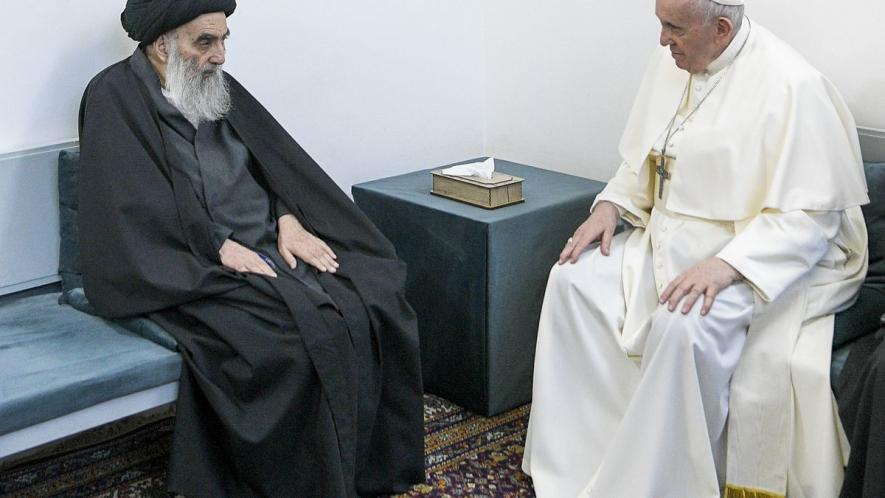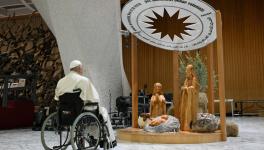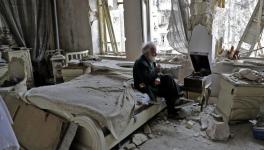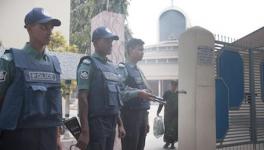Pope Francis, Iraq's Top Shiite Cleric Hold Historic Meeting on ‘Peaceful Coexistence’

Image Courtesy: AP
Plains Of Ur (Iraq): Pope Francis and Iraq's top Shiite cleric delivered a powerful message of peaceful coexistence on Saturday, urging Muslims in the war-weary Arab nation to embrace Iraq's long-beleaguered Christian minority during an historic meeting in the holy city of Najaf.
Grand Ayatollah Ali al-Sistani said religious authorities have a role in protecting Iraq's Christians, and that they should live in peace and enjoy the same rights as other Iraqis.
The Vatican said Francis thanked al-Sistani for having “raised his voice in defence of the weakest and most persecuted” during some of the most violent times in Iraq's recent history.
Al-Sistani, 90, is one of the most senior clerics in Shiite Islam and his rare but powerful political interventions have helped shape present-day Iraq.
He is a deeply revered figure in Shiite-majority Iraq and his opinions on religious and other matters are sought by Shiites worldwide.
The historic meeting in al-Sistani's humble home was months in the making, with every detail painstakingly discussed and negotiated between the ayatollah's office and the Vatican.
Early Saturday, the 84-year-old pontiff's convoy, led by a bullet-proof Mercedes-Benz, pulled up along Najaf's narrow and column-lined Rasool Street, which culminates at the golden-domed Imam Ali Shrine, one of the most revered sites in Shiite Islam.
He then walked the few meters (yards) to al-Sistani's modest home, which the cleric has rented for decades.
A group of Iraqis wearing traditional clothes welcomed him outside. As a masked Francis entered the doorway, a few white doves were released in a sign of peace.
He emerged just under an hour later, still limping from an apparent flare-up of sciatica nerve pain that makes walking difficult.
The “very positive” meeting lasted a total of 40 minutes, said a religious official in Najaf, who spoke on condition of anonymity because he was not authorised to brief media.
The official said al-Sistani, who normally remains seated for visitors, stood to greet Francis at the door of his room — a rare honour. Al-Sistani and Francis sat close to one another, without masks.
The official said there was some concern about the fact that the pope had met with so many people the day before. Francis has received the coronavirus vaccine but al-Sistani has not.
The pope removed his shoes before entering al-Sistani's room. Al-Sistani spoke for most of meeting. Francis was served tea and a plastic bottle of water, but only drank the latter.
Francis paused before leaving al-Sistani's room to have a last look, the official said.
The pope arrived later in the ancient city of Ur for an interfaith meeting aimed at urging Iraq's Muslims, Christians and other believers to put aside historic animosities and work together for peace and unity.
Religious leaders stood to greet him. While Francis wore a mask, few of the leaders on the tented stage did. The meeting was being held in the shadow of Ur's magnificent ziggurat, the 6,000-year-old archaeological complex near the modern city of Nasiriyah.
Ur is also the traditional birthplace of Abraham, the biblical patriarch revered by Christians, Muslims and Jews.
The Vatican said the historic visit to al-Sistani was a chance for Francis to emphasise the need for collaboration and friendship between different religious communities.
In a statement issued by his office after the meeting, al-Sistani affirmed that Christians should “live like all Iraqis, in security and peace and with full constitutional rights."
He pointed out the "role that the religious authority plays in protecting them, and others who have also suffered injustice and harm in the events of past years.”
Al-Sistani wished Francis and the followers of the Catholic Church happiness, and thanked him for taking the trouble to visit him in Najaf, the statement said.
For Iraq's dwindling Christian minority, a show of solidarity from al-Sistani could help secure their place in Iraq after years of displacement — and, they hope, ease intimidation from Shiite militiamen against their community.
Iraqis cheered the meeting of two respected faith leaders.
”We welcome the pope's visit to Iraq and especially to the holy city of Najaf and his meeting with Grand Ayatollah Ali Al-Sistani,” said Najaf resident Haidar Al-Ilyawi.
“It is an historic visit and hope it will be good for Iraq and the Iraqi people.”
Francis arrived in Iraq on Friday and met with senior government officials on the first-ever papal visit to the country, aimed at promoting his call for greater fraternity among all peoples.
It is also his first international trip since the start of the coronavirus pandemic, and his meeting Saturday marked the first time a pope had met a grand ayatollah.
Nearly 25,000 security forces were deployed in Najaf ahead of the pope's arrival, according to the province's governor.
On the few occasions where he has made his opinion known, the notoriously reclusive al-Sistani has shifted the course of Iraq's modern history.
In the years after the 2003 U.S.-led invasion he repeatedly preached calm and restraint as the Shiite majority came under attack by al-Qaida and other Sunni extremists. The country was nevertheless plunged into years of sectarian violence.
His 2014 fatwa, or religious edict, calling on able-bodied men to join the security forces in fighting the Islamic State group swelled the ranks of Shiite militias, many closely tied to Iran.
Get the latest reports & analysis with people's perspective on Protests, movements & deep analytical videos, discussions of the current affairs in your Telegram app. Subscribe to NewsClick's Telegram channel & get Real-Time updates on stories, as they get published on our website.


















